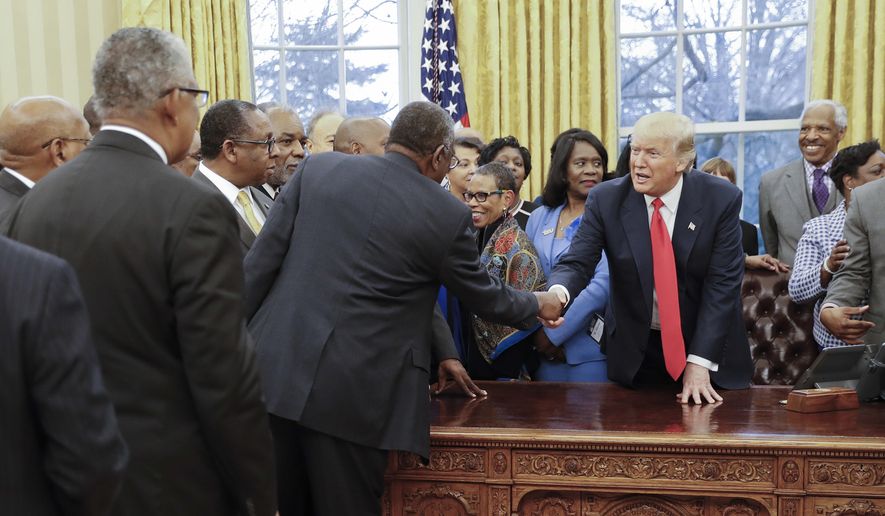President Trump signed an executive order Tuesday aimed at boosting his administration’s support for black colleges, as he seeks a closer relationship with the schools than President Obama had.
The president approved a measure that will move the government’s program for promoting historically black colleges and universities, called HBCUs, from the Education Department to direct oversight by the White House.
“Education has the power to uplift, it has the power to transform and, perhaps most important, education has the power to create greater equality and justice in our lives,” Mr. Trump said in a signing ceremony in the Oval Office with the leaders of about 20 schools.
“That’s why today I am thrilled to be signing an executive order to recognize the importance of historically black colleges and universities — very important. They have played such an important role in achieving progress for African-Americans in our nation’s march for justice,” he said.
He said HBCUs “really have been pillars of the African-American community for more than 150 years … and a grand and enduring symbol of America at its absolute best.”
“With this executive order, we will make HBCUs a priority in the White House, an absolute priority,” the president said.
One goal will be to promote the schools as “strategic partners” in the president’s plan to improve inner cities, a senior White House official said.
The president held another meeting in the Oval Office on Monday with representatives of more than 60 schools; they also met with Vice President Mike Pence and Education Secretary Betsy DeVos.
“You deserve far more credit than you get, and know that, beginning today, this administration is committed to making sure that our historically black colleges and universities get the credit and the attention they deserve,” Mr. Pence told them. “Get ready for a great and energetic partnership in the days ahead.”
During the Obama administration, many HBCU leaders and members of the Congressional Black Caucus were at odds with Mr. Obama on support for the schools.
HBCU advocates complained that the administration’s restrictive federal loan policy was hurting the chances of black families sending their children to the schools, and that overall federal coordination and support for the schools was down.
Mr. Pence said Mr. Trump “has a passion for equal opportunity.”
“He has a passion for expanding opportunities and the hopes and dreams of every American, including those in the African-American community who are not yet experiencing the full range of benefits of the American dream,” the vice president said. “We’re also going to be working on economic development, not only increasing educational opportunities but doing all we can to revitalize communities across this country — large and small — and create opportunities for students that will be joining you on your campuses. We’re committed to this mission.”
There are more than 100 historically black colleges and universities in the U.S., with a total enrollment of more than 300,000 students.
Mrs. DeVos said HBCUs “are real pioneers when it comes to school choice.”
“Their success has shown that more options help students flourish,” she said. “Their counsel and guidance will be crucial in addressing the current inequities we face in education. I look forward to working with the White House to elevate the role of HBCUs in this administration and to solve the problems we face in education today.”
Mrs. DeVos’ comments drew criticism from some who noted that during segregation, HBCUs were not a “choice” for black students but the only option.
“She called them ’pioneers when it comes to school choice,’ ignoring the fact that for most of this nation’s history, HBCUs were the only choice for African-Americans. HBCUs were created because racist admission policies refused to admit African-American students,” said Rep. Elijah E. Cummings, Maryland Democrat.
Mrs. DeVos later issued a statement saying that “providing an alternative option to students denied the right to attend a quality school is the legacy of HBCUs.”
“Your history was born, not out of mere choice, but out of necessity, in the face of racism, and in the aftermath of the Civil War,” she said.
• Dave Boyer can be reached at dboyer@washingtontimes.com.




Please read our comment policy before commenting.